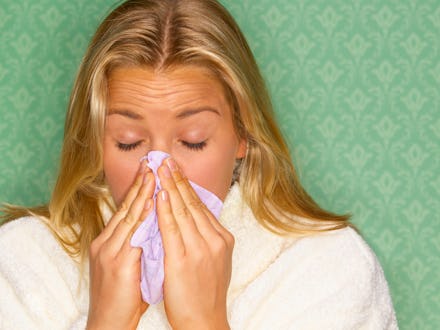Good News! This Freezing-Cold Weather Is Not Going to Make You Sick, Says Science

If you've ever lived in a wintry climate, some caring older relative has likely urged you to bundle up in cold weather so you don't get sick. For me, growing up in Canada, it happened when my parents made me wear a purple balaclava to my very first day of kindergarten.
I could have been spared the embarrassing first-day-of-school photos. Winter may be known as cold-and-flu season, but your snuffy nose has nothing to do with the cold weather itself. Rather, experts agree that we tend to get sick in the wintertime because the cold weather forces us indoors with other people, where germs are more easily swapped.
"So far, researchers who are studying this question think that normal exposure to moderate cold doesn't increase your susceptibility to infection," said a recent Harvard Medical School article on boosting your immune system.
In a 2003 study, researchers in Canada exposed the fallacies of the cold-weather-causes-illness myth, writing that "the data to support a link between cold ambient temperatures and reduced immune function and increased susceptibility to infections in humans is not well delineated."
Past studies have shown a link between cold exposure and poor immune systems, the researchers acknowledged. But there were problems with those studies — some focused on rats and mice, whose biological responses can't always be compared to humans.
"Many of the animal experiments, for example, used cold water immersion as a stressor," the researchers wrote. "Using this model, it is difficult to ascertain whether immune responses changed as a result of cold exposure or due to the fact that the animal was in a life-threatening situation with many other stressors present besides cold exposure."
"Folks created myths to explain what happens to protect their children from getting sick."
Studies have also been conducted on people working in Antarctica for long periods of time.
"The higher respiratory infection rates in the Antarctic summer are likely caused by exposure to people on supply ships who pass the virus onto the over-wintering population," the researchers wrote. "These Antarctic studies are also difficult to use as a model of cold exposure because many other factors, inducing psychological ones, are common during isolation in Antarctica."
The researchers in Canada also conducted their own experiments, one of which examined immune responses in seven men exposed to cold air after spending time submerged in water. The subjects' natural killer cells — a type of white blood-cell key to our immune function — were not impaired after two hours of cold air exposure.
"Bad weather does not cause colds," Dr. Carl Olden, a family practitioner in Washington, said, according to Everyday Health. "These are old wives' tales from an era when we had no ability to treat fever or other complications of infection. Folks created myths to explain what happens to protect their children from getting sick."
Wait! Didn't researchers prove last year that cold viruses breed better in cooler temperatures? They didn't get all the way there. Researchers at Yale ran tests on the cold virus in mice, ultimately finding that the mouse immune system put up a weaker fight when exposed to cold temperatures.
But the tests were conducted on mouse cells in petri dishes — not real, live humans. One doctor, who wasn't involved with the study, cautioned the New York Times "that rhinoviruses infecting cells in a dish may not behave as they would in, say, a wheezing subway commuter."
All that being said, it's still important to stay warm this winter. Not to ward off colds, of course, but to maximize your time doing outdoor activities.